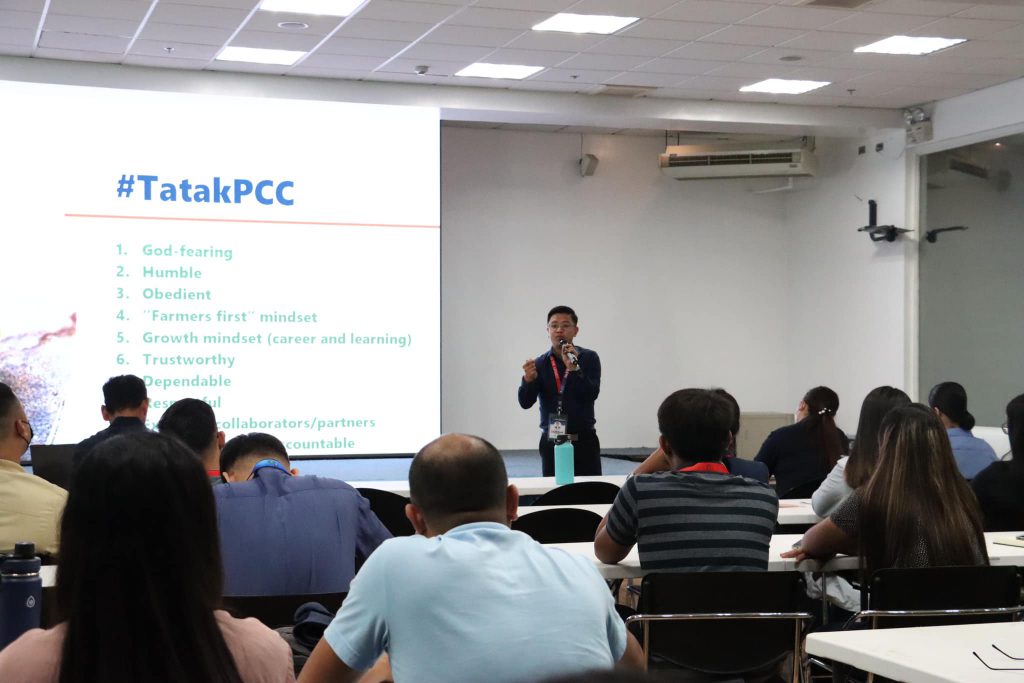DA-PCC, DA-BAR conduct inception meeting for various projects

To ensure that the various R&D projects to be funded by DA-BAR and to be implemented by DA-PCC will achieve their objectives, Dr. Marvin A. Villanueva, Scientist I, OIC of the Research and Development Division, emphasized the importance of active communication and clear directions during an inception meeting held at the DA-PCC National Headquarters. Dr. […]
New episode of Cara-Aralan Webinar Series features integrated dairy farming champ in Guimba, Nueva Ecija

Lodivico Guieb Sr., a dairy buffalo farmer, shared his inspiring account of success during today’s webinar episode “Kwento at Kwenta ng Tagumpay ni Lodivico”—a true “lodi” story that anyone who ventures in this business might take inspo from. “Guieb Dairy Farm” ventures into integrated farming and animal production. Said farm has been an Agricultural Training […]
KOICA, DA-PCC hold a project implementation launch meeting

Earlier today, the Department of Agriculture-Philippine Carabao Center (DA-PCC) and Korea International Cooperation Agency (KOICA) held a project implementation kick-off meeting for the project titled “National Dairy Herd Improvement (NDHIP) and Enterprise Build-Up,” which has a project period of 2023 to 2027. According to Dr. Liza G. Battad, PCAF technical adviser and project leader, the […]
DA-PCC introduces improved NEO program

The DA-PCC’s New Employee Orientation Program, or NEO, took place on April 4 at Eusebio Hall. It is a learning platform that was designed for new employees, teaching them not only how to be employees, but also the purpose for which they will work. Several discussants from the agency’s divisions and sections appeared on the […]
DA-PCC, OMSC partner to establish Mindoro Carabao Conservation and Nucleus Farm

The DA-Philippine Carabao Center (DA-PCC) has forged a partnership with the Occidental Mindoro State College (OMSC) in a bid to expand its research and conservation efforts by including native animal protection in its priorities. In a simple ceremony held during DA-PCC’s 30th anniversary celebration on March 31, DA-PCC OIC Executive Director Dr. Caro B. Salces […]
DA-PCC celebrates 3 decades of service as an R&D institution

The DA-Philippine Carabao Center celebrates three decades of service as the lead agency responsible in conserving, propagating, and promoting the carabao as a source of milk, meat, draft power and hide to benefit the rural farmers. This year’s anniversary is aptly themed, “PCC at 30: Continuing the legacy of service excellence and synergy”, which aims […]
DA-PCC, commodity DA-Biotech centers inaugurate DNA Sequencing Facility

In conjunction with the weeklong celebration of the DA-PCC’s 30th anniversary, the DA-Biotech DNA Sequencing Facility was inaugurated at the Livestock Innovations and Biotechnology Complex this morning.This project was a collaboration between the DA-Biotechnology Program Office (DA-BPO), the DA-Crops Biotechnology Center (CBC), the DA-Fisheries Biotechnology Center (FBC), the DA-Livestock Biotechnology Center (LBC), and the DA-PCC […]
Meet the new meat!

Kardeli, DA-PCC’s brand of carabao’s meat, is now available all day with pre-cooked specials for dine-in or for takeout at its name store that opens today at the Milka Krem compound in the Science City of Muñoz. The soft launching of Kardeli All-Day Diner marks the opening day for the weeklong 30th anniversary celebration of […]
VBAITs, LGU techs undergo AI and PD training in Bohol

The DA-Philippine Carabao Center at Ubay Stock Farm (DA-PCC at USF) culminated its month-long trainings on basic artificial insemination (AI) and pregnancy diagnosis (PD) on large ruminants for village-based and LGU technicians and intensified reproductive management training on March 9.”The advanced training aimed to capacitate and improve the efficiency of our existing AI technicians in […]
Cooking with buffalo’s milk highlights the 5th Semana Kang Mangunguma

The Philippine Carabao Center at WVSU (PCC at WVSU) held its first ever Cara Cooking Show and Cara-ugnayan with Farmers at Calinog Plaza in Calinog, Iloilo last March 3. The event is related to the center’s participation in the 5th Semana Kang Mangunguma, an annual tribute to LGU Calinog’s farmers. The theme of this year’s […]











